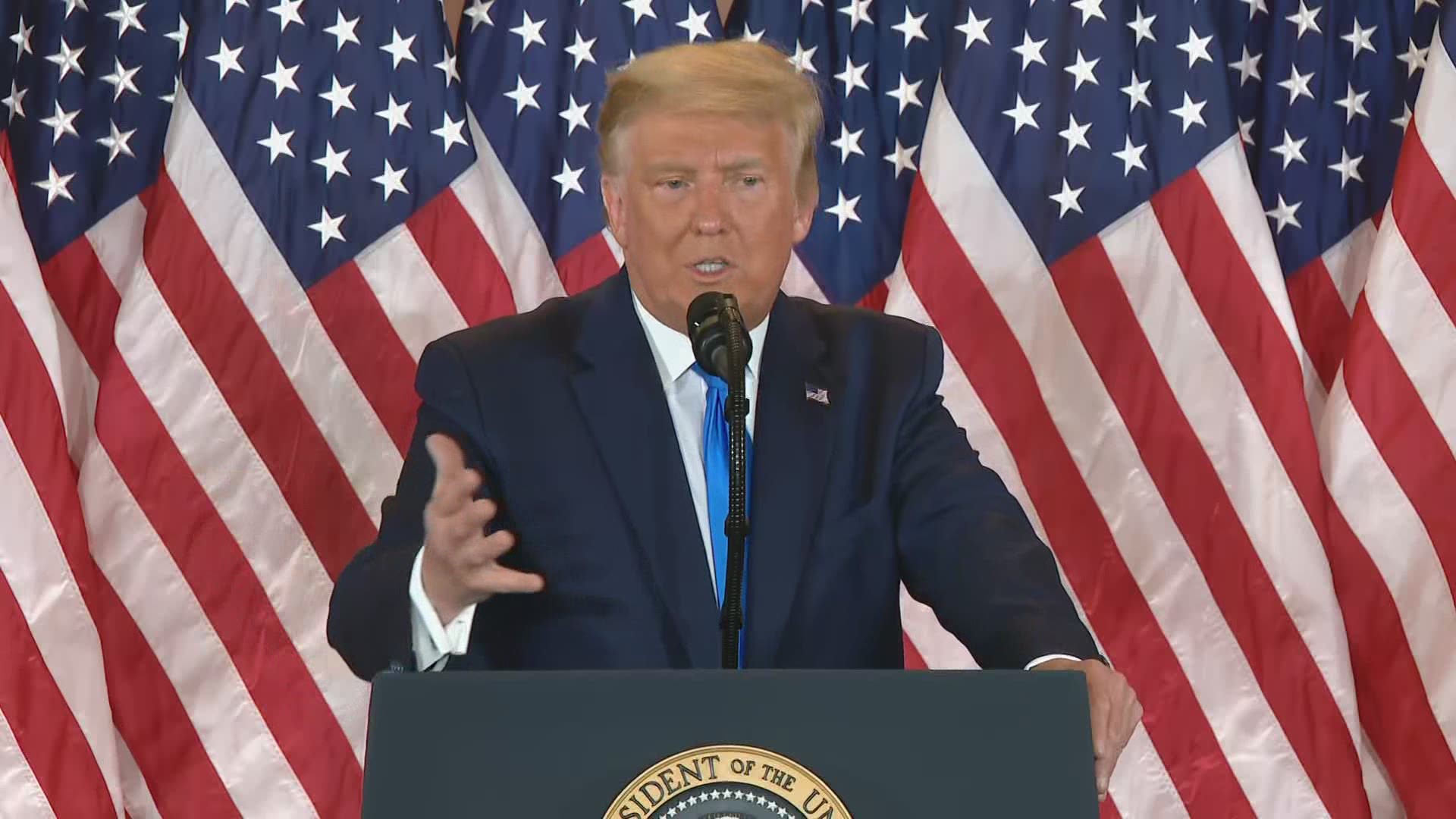Trailing in the electoral college to Joe Biden, and with a handful of battleground states expected to count votes possibly late into the week, President Donald Trump prematurely declared victory in the 2020 election Wednesday morning. And as he has threatened before, he said he plans to take his case to the U.S. Supreme Court.
The Associated Press is not calling the presidential race yet because Trump nor Biden has secured the 270 electoral college votes needed to claim victory. Biden was leading at the time of Trump's declaration.
"We will win this and as far as I'm concerned we already have won it," Trump told supporters at The White House.
“Frankly, we did win this election," he added.
At the time Trump made his statement, according to AP counts, Trump had 213 electoral votes while Biden had 225. Minutes later, AP called Arizona and Maine's statewide vote for Biden, increasing his lead to 238-213.
Several key states are too early to call, including Pennsylvania, Georgia, Wisconsin, North Carolina, Michigan and Nevada. But at the time Trump made his claim, he was leading in some of these states with votes still to be counted.
Trump vowed to ask the Supreme Court to weigh in on the inconclusive election. He cried foul over the election results, calling the process "a major fraud on our nation." But there's no evidence of foul play in the cliffhanger.
"We'll be going to the U.S. Supreme Court — we want all voting to stop," Trump said. In fact, voting had ended by the time Trump spoke. Only counting of ballots remained.
The Biden campaign called Trump's declaration a "naked effort" to take away the voting rights of Americans, and vowed to fight to have every vote counted.
"It was unprecedented because never before in our history has a president of the United States sought to strip Americans of their voice in a national election," read a statement from Biden Campaign Manager Jen. O'Malley Dillon.
Pennsylvania Gov. Tom Wolf vowed every vote in his state would be counted.
"We still have over 1 million mail ballots to count in Pennsylvania. I promised Pennsylvanians that we would count every vote and that’s what we’re going to do," Wolf tweeted after Trump's speech. "Let’s be clear: This is a partisan attack on Pennsylvania’s elections, our votes, and democracy. Our counties are working tirelessly to process votes as quickly AND as accurately as possible. Pennsylvania will have a fair election and we will count every vote."
Trump insisted leading up to the election that the winner must be known on election night. The fact is, states rarely finish tallies on Election Day.
The president tweeted Wednesday morning appalled by the different tallies from the night before. His tweet read, "Last night I was leading, often solidly, in many key States, in almost all instances Democrat run & controlled. Then, one by one, they started to magically disappear as surprise ballot dumps were counted. VERY STRANGE, and the 'pollsters' got it completely & historically wrong!"
Twitter flagged the tweet claiming that it is "disputed and might be misleading about an election or other civic process."
States such as Michigan, Pennsylvania and Wisconsin, all with Republican-led legislatures and all of them swing states, made a conscious decision to wait so there would be no counting of mail-in ballots prior to Election Day. As a result, it could take days to tally enough ballots to project a winner.
A few minutes later Trump added, "How come every time they count Mail-In ballot dumps they are so devastating in their percentage and power of destruction?"
Democrats typically outperform Republicans in mail voting, while the GOP looks to make up ground in Election Day turnout. That means the early margins between the candidates could be influenced by which type of votes — early or Election Day — were being reported by the states.
The TEGNA national VERIFY team also found there is no specific federal cutoff for counting ballots, other than that states must have results ready by the time the Electoral College votes in December. This year, that’s Dec. 14. That allows enough time for states to resolve any disputes over the ballots. States also vary on the deadlines for mail-in or absentee ballots.
John E. Finn, Professor Emeritus in the Department of Government at Wesleyan University, wrote in The Conversation that states are the ones that conduct elections. Therefore, it's state courts where election disputes are most often fought.
"In a closely contested national election, where the results in some states are in doubt and may be for many days, this will likely result in several cases being filed simultaneously in several states, and by both major party candidates," Finn wrote.
Finn says that for a contested election case to move up to federal court, "there must be must be an allegation that federal constitutional rights have been violated." That's what happened in Bush v. Gore. The U.S. Supreme Court, in a 5-4 decision, ruled that a recount mandated by the Florida Supreme Court violated the equal protection clause of the Constitution.

